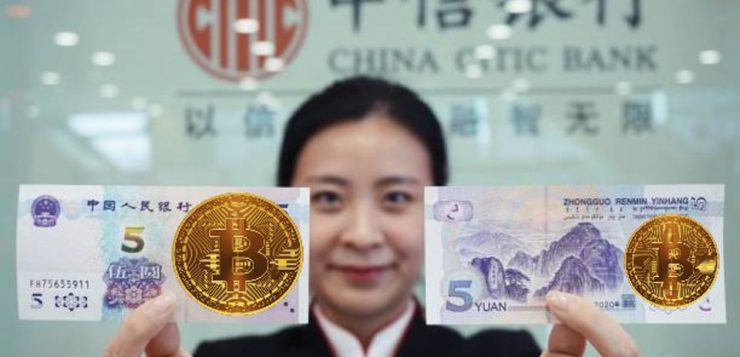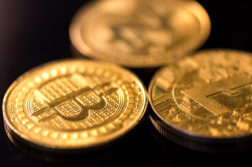Bitcoin has become a mainstream Wall Street investment now. It’s on every investor’s radar. So like any other investment, you have to wonder: what can the government do to screw it up, or make it a buy?
Last week, we all saw this Tweet by Miami’s Mayor.
It didn’t do much to stop the sell-off in Bitcoin.
After cracking $40,000, BTC is now back to around $34,000-$35,000. Pretty much no one I talk to about Bitcoin thinks this thing is going back to $5,000 or so, which is where it was a year ago. In March, when the coronavirus became a pandemic, it was around $3,300. Unless you bought the Blink Charging Company’s stocks (I did, and sold it up over 150%) over the last two months, what’s been better than Bitcoin?
I started thinking: what if central banks got in and started buying? Maybe they want to hoard it and take it out of circulation.
“That will be Christmas coming every day for Bitcoin traders. Even a rumor like that will blow the Bitcoin price to a new territory,” says Naeem Aslam, chief market strategist for AvaTrade in the U.K.
If you had someone like the People’s Bank of China saying, alright, enough of this Bitcoin nonsense, we’re taking this out of circulation by sucking it out of the market. They would have to find willing sellers on the other side. If the PBoC or the Bank for International Settlements — the central bank of central banks — started buying a few million Bitcoin, the price would rise. Those who didn’t sell would be holding virtual gold until those central banks were able to assure that gold no longer had any value. You’d have to shut down miners, which is not impossible. This would be the BTC doomsday scenario, I guess.

“I think there is a quite low chance that China’s central bank will buy Bitcoin,” says Aries Wanlin Wang, a crypto investor in Singapore. “The only possibility would be all major countries adopt Bitcoin as a central bank reserve. China won’t be the first mover,” he thinks.
There are a few reasons why China — who I thought would be the most obvious mover as they are testing their own digital yuan — would not be a BTC buyer, Wang says:
The Chinese government doesn’t think Bitcoin is a currency. It’s a commodity; digital gold as far as they are concerned. Bitcoin has been used in many black-market industries and Beijing likes control and might not want to have to pay them for their Bitcoins. And lastly, the Chinese central bank doesn’t see any intrinsic value in Bitcoin; at least for now.
Bitcoin’s Black Swan
For many retail investors, Bitcoin is a mystery. We don’t know what we are dealing with, or what the risks are. We don’t get any warnings.
If you are a risk-taking investor, like me, and you buy emerging market stocks, you knew already what was coming if you were an investor in Chinese telecom stocks. An Executive Order signed by President Trump is forcing divestment from the likes of China Mobile. You had fair warning.
If Petrobras, the Brazilian oil firm, is under investigation for financial crimes and caught up in a government corruption scandal, you had information. You would also know that Petrobras, one of the biggest oil companies in the Americas, comes with pricing risk associated with oil futures. You would know that it comes with the risk of more people switching to electric cars; of governments punishing fossil fuel producers with regulations.
Bitcoin comes with none of those things. It’s easy to let imaginations run wilder with Bitcoin.
One Boston-based firm that is buying Bitcoin now but did not talk on the record said that investors could conceivable fear a central bank black swan bitcoin event. But other cryptocurrencies like Ethereum would take BTCs place as the decentralized web fan’s favorite crypto. The central bank digital currency that China is toying with is completely different than traditional crypto, and not really seen as a competitor, this person said.
“There is no competitive relationship between the two. Even if China, the European Central Bank, the Fed, or the Bank of England all ganged up and got everyone to sell their Bitcoins currently on the market — which is around 18 million Bitcoins — more decentralized currencies would be created and issued in its place,” they said. “So this is not a fear I would have. It is not an economic option for China or the ECB to buy BTC to take it out of circulation. Since there are a large number of cryptocurrency investors in China, the move would really make wealthy Chinese angry, for whatever that is worth.”
Okay. So now I’m less scared of that particular Bitcoin black swan.
“Yeah, I don’t think that a huge central bank buying bitcoins and removing them from circulation is a real threat,” says Jung Sanghun, CEO of Pando Browser and also an operator of Filecoin data centers in South Korea and China.
“That’s because they would have to buy those coins from whales and institutions, who aren’t likely to simply hand them all over. There is also a large base of Bitcoin holders and ‘OG whales’ that aren’t planning on parting with substantial portions of their coins anytime soon,” Sanghun says.
The ‘OG whales” are the people who have thousands of BTC and purchased many of them at less than $1,000 a pop years ago. If they knew the central banks of the world were coordinating to buy BTC out of circulation, they would bid up the price to six figures, easily. And probably ask for tax exemptions when converting to fiat.
“The prospect of a central bank buying BTC to remove them from circulation simply doesn’t make a lot of sense and would only decrease the supply of available coins — thus pumping prices to extremely high levels as demand cannot be fulfilled. The coins in circulation would become increasingly scarce.” Sanghun says.
More realistically is central banks working to minimize the threat of Bitcoin and other cryptocurrencies by creating their own digital currencies. The average person feels like Bitcoin is too complicated, setting up crypto wallets at companies they have never heard of and wary of hacks. This is the reason the Grayscale Bitcoin Trust (GBTC) ETF is doing so well. It’s the easy way into Bitcoin. No more forgetting personal keys and password recovery phrases that are miles long: cat sandwich speedy motorcade elephant sidewalk icecream tomorrow xylophone anthills. Yeah, unless you write that down in five different places you are never ever going to remember that.
Assuming central banks see Bitcoin as a threat, they would be more inclined to provoke governments into over-regulating it instead, while issuing their own fiat-pegged coins.
We can already see that happening in China. Though at this point, if the PBoC wanted a few hundred thousand Bitcoins, it would take us to $50,000 in a flash.
Author: Kenneth Rapoza
Read more at: https://www.forbes.com/sites/kenrapoza/2021/01/17/bitcoin-imagining-a-central-bank-buy-in/?sh=7406e4939225:







